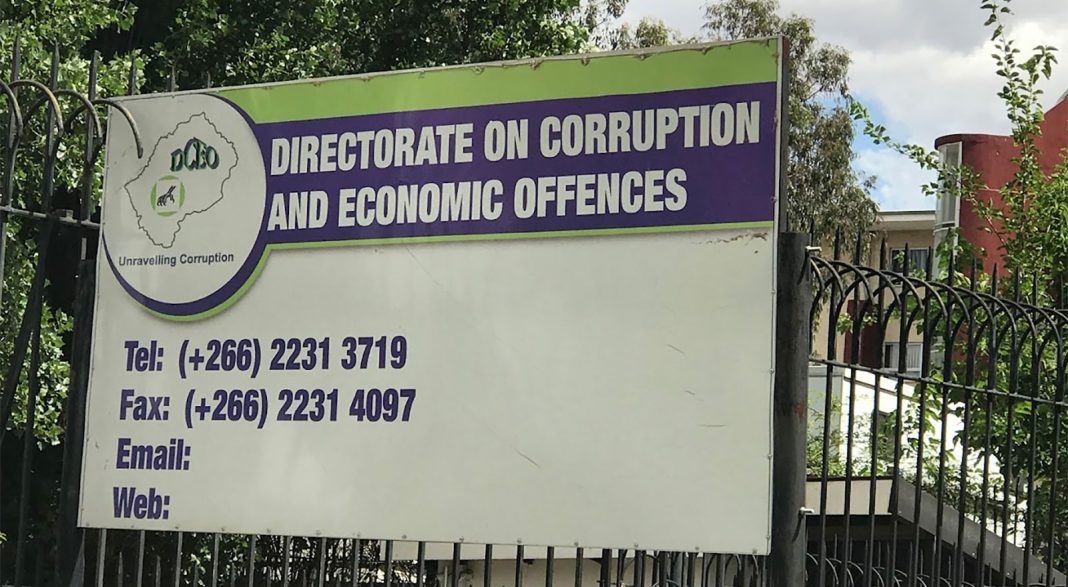The Director-General of the Directorate of Corruption and Economic Offences (DCEO), has expressed concern that members of the National Assembly and Senate are lagging behind in submitting their asset declaration forms.
In a bid to prompt them to comply, Advocate Brigadier Sello has written to the clerks of the two Houses, urging them to push the parliamentarians to declare their assets.
Advocate Sello said this while presenting DCEO’s financial assessment for the first and second quarters before the Portfolio Committee on Law and Public Safety this week.
DCEO had requested public officers, including procurement officers at state-owned organisations, to declare their assets by the end of November last year.
According to Sello, only Cabinet members, including Prime Minister Sam Matekane, and a few other MPs have submitted their declaration forms, which are awaiting verification. This indicates a significant gap in compliance among lawmakers, who are expected to set an example for public servants.
Adv Sello indicated that the DCEO faces major challenges in verifying asset declarations due to limited resources, pointed out that the process is slowed down because only one officer is assigned to handle this sensitive task.
“We have a major challenge of verifying asset declarations because we have only one officer in that office. Given the mandate and the sensitivity of the process, it needs us to be very vigilant when we appoint someone, we are looking into that,” he said.
He noted that asset declaration is one of the most crucial tools in fighting corruption, and it is therefore essential that all public officials comply with the requirements.
For the financial year 2025/26, the DCEO aims to reduce the prevalence of corruption from 72 percent to 60 percent.
Adv Sello said they also intend to enhance transparency and accountability mechanisms within the DCEO, as well as strengthen the investigation capabilities of its officers.
“For this financial year, we aim to increase collaboration with local and international bodies because we have learned that corruption is a very complex matter that needs a lot of collaboration,” he added.
Member of the committee, Advocate Lekhetho Rakuoane, emphasised the importance of public officers declaring their assets, stressing that it is crucial for promoting transparency and accountability.
During the deliberations, Rakuoane urged the DCEO to take concrete measures to compel public officers to comply with the asset declaration requirement.
Specifically, he suggested that the anti-corruption body should consider publishing the names of public officers who hesitate or fail to declare their assets on public platforms or social media.
Rakuoane expressed disappointment that some leaders have not declared their assets, adding that compliance should start from the top.
“We should not be hearing that some of the leaders that we were expecting to lead by example have not declared their assets. People who fail to declare their assets should be exposed on social media,” he urged, highlighting the need for accountability and transparency in public office.
Finance manager, Mathibe Rampai, who presented the financial assessment, provided details on the agency’s budget and expenditure. According to Rampai, the DCEO was allocated a total budget of M69 billion. Salaries accounted for M30 million, of which M7 million had already been spent.
A total of M408,552, was budgeted for vacant posts but no funds had been released yet, he noted.
Rampai further highlighted that vehicle maintenance had been allocated M743,000, with M670,000 spent. Allowances were budgeted at M299,000, with M95,000 spent, while fuel and lubricants had a budget of M715,000. Only M161 has been used.
The rental budget was M3 million, with M746,000 used in the first quarter, leaving a balance of M153,000 for this period. However, he stated that rental invoices for the Post Bank building were pending processing due to the landlord’s outstanding tax clearance with the Revenue Services Lesotho (RSL).
In terms of revenue collection, Rampai reported that the DCEO generated M73,460 in the first quarter, sourced from the sale of tenders, software licensing, and commission on pay deductions.
A member of the committee, Jacob Makhalanyane, expressed discontent over the task of collecting revenue being assigned to the DCEO.
According to Makhalanyane, as a law enforcement agency, the DCEO’s primary mandate is to prevent, investigate and prosecute corruption and money laundering cases, not to generate revenue.
Makhalanyane was reacting to the information from the DCEO that the Accountant General had pleaded for all ministries to collect revenue.
Makhalanyane warned that assigning the DCEO another task outside its mission and legal framework could compromise its effectiveness in performing its core functions.
He highlighted the potential risks of diverting the DCEO’s attention and resources away from its core mandate, adding that by focusing on its primary responsibilities, the organisation can effectively combat corruption and ensure accountability in the country.
“DCEO is a law enforcement agency mandated to investigate and prosecute corruption. Giving them a task of generating revenue is unfair; they should focus on their mission,” Makhalanyane added.








